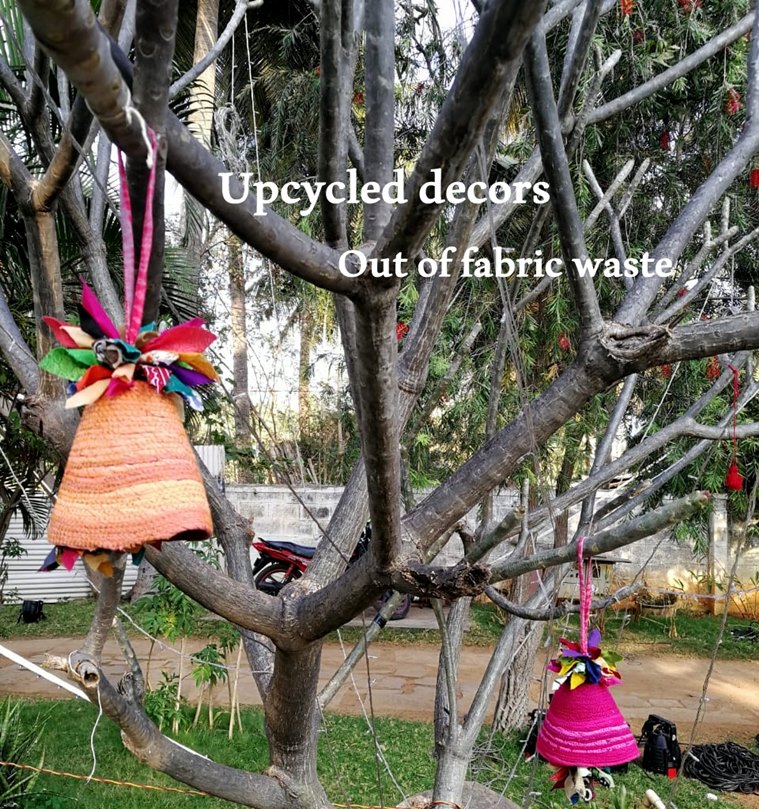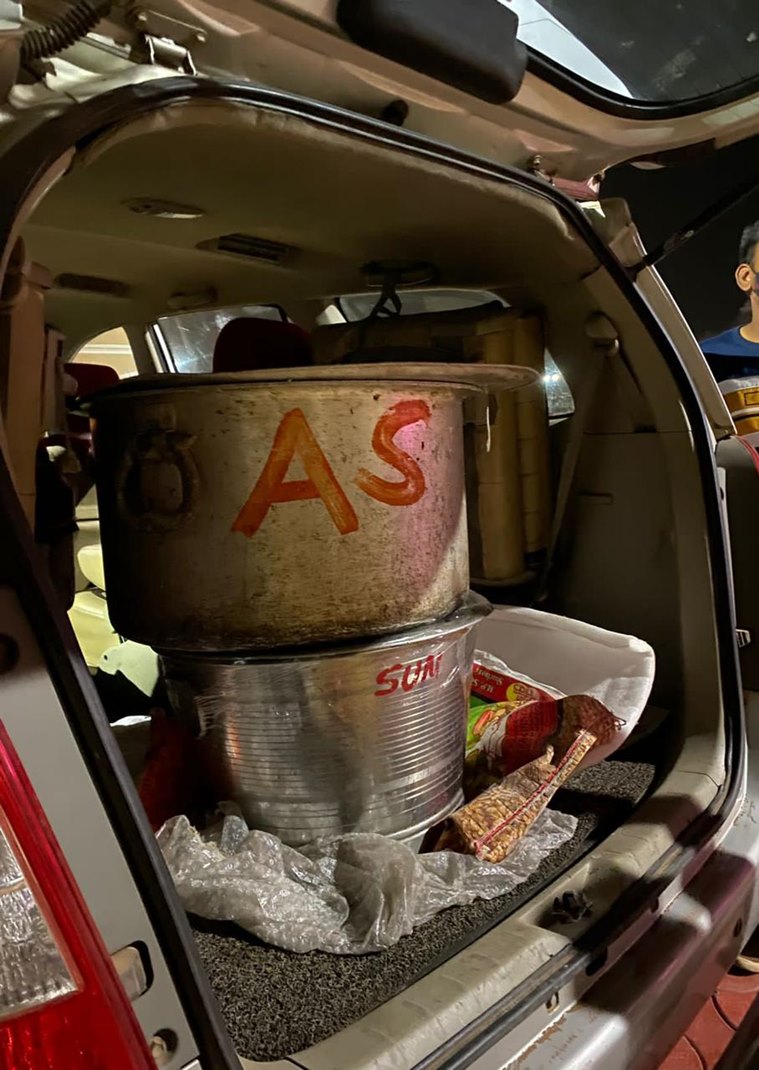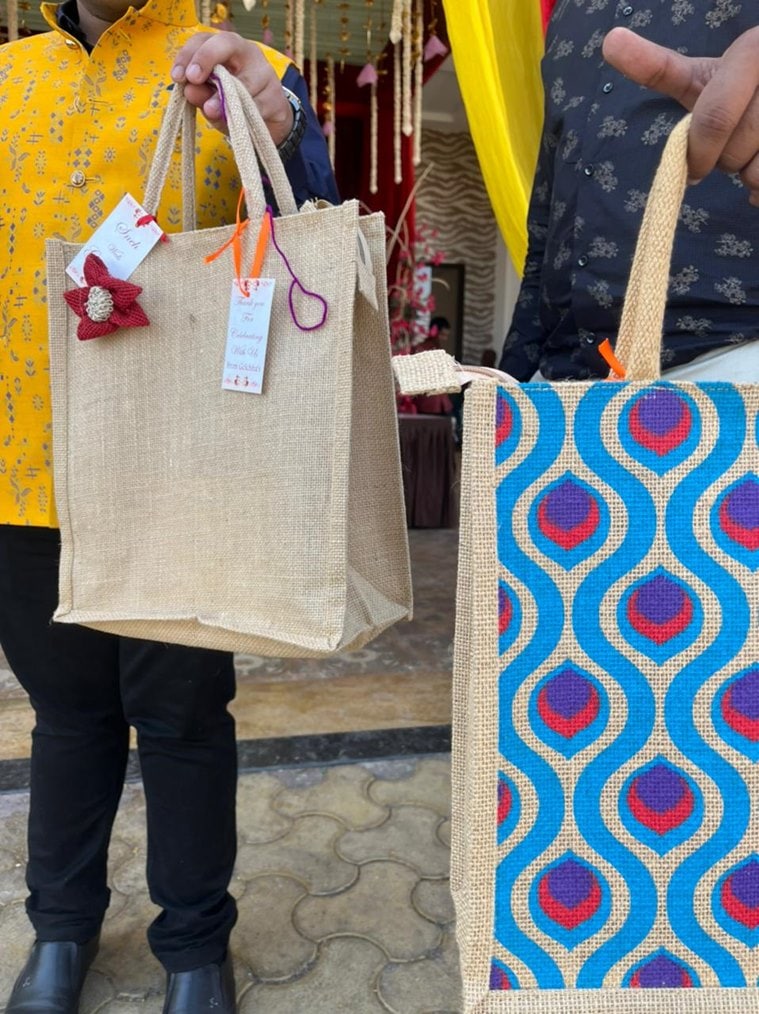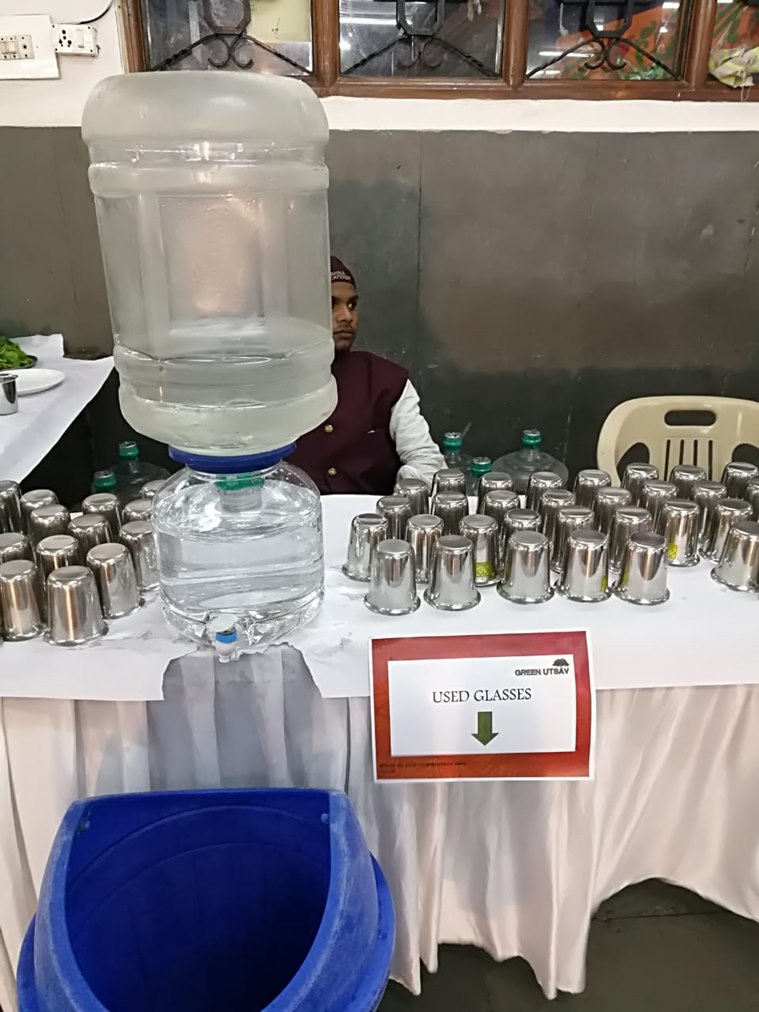A wedding is considered to be one of the most auspicious and special days in one’s life. Months ahead of the actual wedding, people meticulously plan each and every detail to ensure the event goes smoothly. However, despite being a joyous occasion, weddings are also somewhat synonymous with waste — leftover food, floral décor, loud music, and single-use plastics among other things — all leading to pollution at many levels.
Buy Now | Our best subscription plan now has a special price
With increased awareness now, the wedding industry is seeing a positive change with a growing number of couples opting for sustainable practices — from how leftover food is treated to what materials/products are used for décor purposes. This is where the concept of ‘green wedding’ or ‘eco-friendly wedding’ comes in.
Waste collection during an eco-friendly wedding. (Source: Ashwin Malwade)
Simply put, a green wedding is a celebration where the couple and the organising families try to reduce the effect of the event on the environment by employing eco-friendly practices. “My specialisation is in solid waste management, and wedding is one event where we create the maximum amount of solid waste. So, I decided to make my wedding as sustainable as possible,” said Garima Lunia, who got married in February this year.
Best of Express Premium
Premium
Premium
Premium
Premium
Elaborating on the same, Ashwin Malwade, Co-founder of Greenmyna, an eco-friendly wedding organising startup, said, “Food is the biggest waste in weddings — up to 3,000-4,000 kilos. The carbon footprint of a traditional Indian wedding is equivalent to cutting 100 odd trees. Then, single-use plastic is another issue. Even though plastic can get recycled, it can’t be used indefinitely and will go to landfills at some point. Also, bouquets, flowers, gifts etc, too, contribute to massive waste that a traditional wedding produces.”
To counter this, he, along with his wife, started Greenmyna in 2020, an eco-friendly wedding organising startup. “Nupur and I had an eco-friendly wedding in 2019. After that, many people reached out to us to ask how can they make their weddings more sustainable. So, we decided to open a small start-up and reach out to people who may like this concept but don’t know how to go about it.”

Green Utsav, another eco-friendly event organising company, was started in 2016 to provide green alternatives for all party needs. “As part of volunteer groups in Bangaluru, we used to spread awareness about sustainable living topics in societies/schools/corporates. During our awareness sessions, people used to ask about alternatives to paper cups or balloons etc. This made us realise that only awareness won’t work and we need to provide alternatives too. Thus, I started ‘Rent a Cutlery’, with a fellow waste management activist, Lakshmi Sankaran. Soon, I realised that parties generate a lot of waste — and I started Green Utsav. In just a few months, we got a very good response not only from Bangalore but from other cities,” Rishita Sharma, founder, said.
Green weddings stand in contrast to traditional weddings in their very approach towards waste, invites, use of plastics and carbon emission. “We get involved from the beginning – selecting a green invite. We use recycled paper and use minimum pages. For friends, we create e-invites. Then, we talk to all vendors to make sure we use as many reusable items as possible. Additionally, we replace plastic bottles with water stations having reusable glasses and tissue paper with cloth napkins. For decorations, we keep it minimal and avoid plastics. In Bangalore, we distribute leftover food with the help of our partner NGO,” Sharma explained.
It’s something similar for Greenmyna which keeps segregation of waste as its priority. “The moment dry and waste get mixed, it becomes non-recyclable. What we ensure is proper segregation of waste at weddings so that dry waste can be sent to a recycling facility and wet waste gets composted. When food waste goes to landfills, it gives out methane – one of the largest contributors to global warming.”

While solid waste and plastics continue to be the biggest environmentally-damaging products of a traditional wedding, carbon footprints created due to the transport of guests is another harmful effect. “To reduce the carbon footprints caused by transport during the wedding, we plant trees. We do a carbon audit and collect the data and tell the client the steps needed to mitigate it,” Malwade said.
This was practised by Garima, who planted 51 trees in Kashmir to mitigate the carbon footprints created during her wedding. “We composted around 50 kgs of floral waste, 800 kgs of food waste (leftover food), kulhads etc. The plastic bottles went for recycling. We tied up with the Ministry of Corporation for the same. The remaining food was fed to 2000 people apart from the wedding guests. We opted for bamboo toothbrushes and tissue papers from waste paper pulp for guests. We used recycled décor. I made the toiletries myself. For the event, I used my mother’s sari and upcycled it. We didn’t use any straw or cling film during the wedding,” she said, sharing other eco-friendly details from her green wedding.
While the concept of green weddings is still at a nascent stage in India, it’s gradually growing with developing eco-consciousness. “People have realised what harm wedding does to the environment. The realisation struck hard during the pandemic. So, people realised that when humans contribute less to carbon footprints, nature gives back in return and it has a positive impact. There is a huge eco-conscious community that exists in India. If you go back in time, we, as a country, have always been conscious of the environment. It was only after the advent of single-use plastic and life of convenience that we have changed as a community. But, once again, people are growing aware and wish to host green events,” Malwade said. It was no different for Sharma who agreed to an increased demand for green weddings in recent times.

However, despite the significantly growing inclination, the concept continues to be hampered by certain challenges. “We get so many queries but not all agree on a green wedding as they are under peer pressure. Once people stop thinking about what other people will think about not using tissue paper or serving water in steel glasses, only then will they be ready for a green wedding. Many times, the couple wants to do a green wedding but their parents won’t support them or vice versa. However, we are hopeful to see a positive change,” Sharma added.
To increase awareness about the same, Malwade believes social media to be “a great asset”. “If someone is doing something eco-friendly, put it on social media and let people know the impact it has. Additionally, awareness at civic level is also very essential.”

“Our generation has access to all kinds of resources and technologies. Thus, we must opt for eco-friendly events for the planet. Sustainability is gaining so much attention all over the world; we must also do our bit, especially on our special days,” Garima concluded.
📣 For more lifestyle news, follow us on Instagram | Twitter | Facebook and don’t miss out on the latest updates!